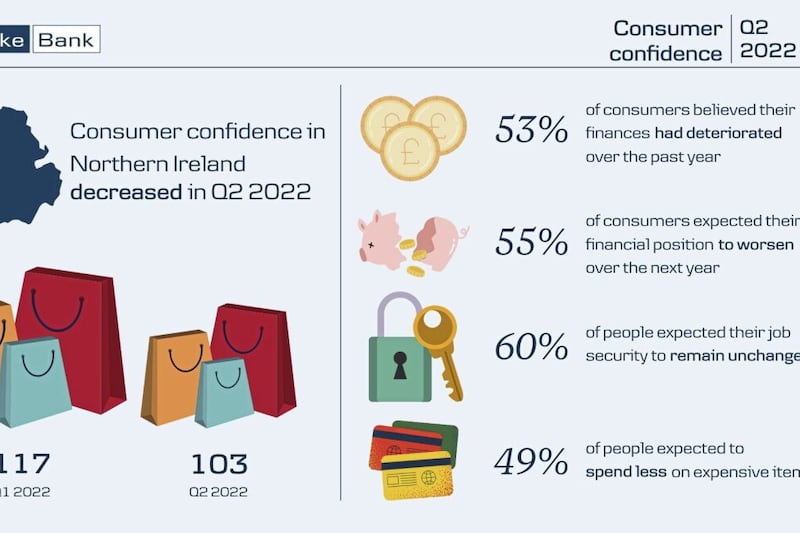LAST week saw the initial publication of two industrial strategy documents that will drive the future direction of Northern Ireland’s economy. The UK Government launched a consultation on its industrial strategy green paper last Monday and the Department for the Economy began a consultation on its draft industrial strategy for Northern Ireland the following day.
As expected, the two documents cover some common areas. For example, both strategies place a particular emphasis on improving productivity and ensuring that economic growth is spread across people and geographies. There is also some overlap on the objectives that the documents put forward. The UK and Northern Ireland strategies both aim to place a greater focus on commercially successful research and development, to increase skills levels across the workforce and to make infrastructure improvements.
The publication of these draft industrial strategies is welcome news for households and businesses in Northern Ireland and the hope is that they will begin to address some of the issues that are holding back the local economy.
On average, between 1997 and 2015 nominal GVA per hour worked, a measure of labour productivity, was around 18 per cent lower in Northern Ireland than the average for the whole of the UK. Over the same period, the inactivity rate in Northern Ireland has been, on average, 5.8 percentage points above the headline rate for the UK. The latest labour market data also shows that Northern Ireland has the highest inactivity rate of the 12 UK regions.
Median hourly pay in Northern Ireland has been consistently below the UK level with 2016 pay of £12.21 in Northern Ireland comparing unfavourably with £13.59 at a UK-wide level. And Northern Ireland is in the bottom three among the UK regions for the number of private sector businesses per 10,000 adults.
Addressing these issues will likely be a difficult task for the next Executive, but it's encouraging to see some ambitious targets within the draft strategy. For example, by 2021 the aim is to have created 50,000 new jobs. Since early 2012, around 40,000 employee jobs have been added in Northern Ireland.
By 2025 the target is to double the amount that tourists spend in the region. One of the 2030 goals is to raise Northern Ireland into the top three most competitive small advanced economies based on the competitiveness rankings used by the Department for the Economy. It currently sits in last place, behind both Scotland and the Republic of Ireland.
But despite the scale of the challenges, the Northern Ireland economy has many strengths that policy-makers should be able to build on in pursuit of these aims. Northern Ireland has excellent universities which will have an important role to play in working with businesses to drive ground-breaking research and development, and equipping the workforce of tomorrow with the skills they need to thrive.
Queen’s University and Ulster University already work alongside the business community and further collaboration will be crucial to achieve the aim of accelerating innovation and research set out in the local draft industrial strategy. Businesses here should also seek to work closely with universities and schools to ensure that, through studying and work placements, young people are equipped with the skills they need to find a job whenever they leave the education system.
Northern Ireland also has some momentum on the export front. Looking at the most timely regional trade in goods statistics published by HMRC, exports from Northern Ireland in the year to 2016 quarter three increased by 6 per cent compared with the year to 2015 Q3. On this rolling annual over rolling annual basis, our exports have been growing for the last five quarters. Of the other UK regions, only the West Midlands and the South East can make the same claim.
While we shouldn’t draw too many conclusions from this trend, it does suggest that businesses in Northern Ireland have been relatively successful at tapping into external markets recently and that support must continue to be given to them as they steer through the uncertainty around future trade with the EU and begin looking for trade opportunities in other economies as well. This will be important if Northern Irish companies are to succeed in global markets, as the Department for the Economy hopes they will.
Some of the world’s best known organisations currently have a presence in the local economy. This includes financial services firms like Citi, professional services firms like PwC and EY, technology businesses like Intel and IBM, law firms such as Baker & McKenzie and of course HBO’s much publicised Game of Thrones TV series is partly filmed in Northern Ireland.
It must be hoped that organisations such as these continue to invest and grow locally, providing high-skilled and creative jobs so that our talented young people can build successful careers here in Northern Ireland.
Of course, we must also remember that the local economy is not immune to the forces that are driving change across the globe, particularly rapid improvements in technology. It is right that businesses here should be looking for opportunities to embrace new technologies that will help them to become more efficient and effective.
But it is important that businesses, government and indeed, educational institutions work together to ensure that learning does not stop when individuals leave school or university. Instead people must now embrace, and have the means to pursue, lifelong learning so that their careers can evolve alongside technology rather than in competition with it.
Northern Ireland’s economy will face some challenges in the years ahead. These include uncertainty driven by recent developments, but also long standing issues within the labour market and commercial environment. However, the region is well equipped to deal with these and businesses here should engage with both local and central government to ensure that the draft industrial strategies published recently deliver for all of Northern Ireland.
:: Conor Lambe is Danske Bank economist in Northern Ireland. Follow him on @ConorLambe
:: Next week: Richard Ramsey







